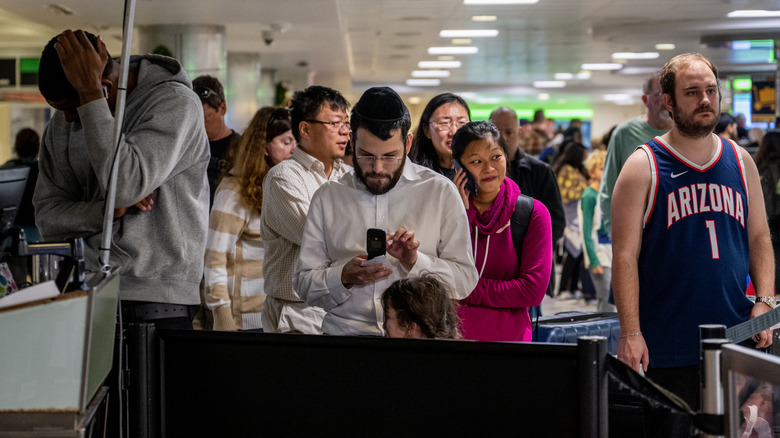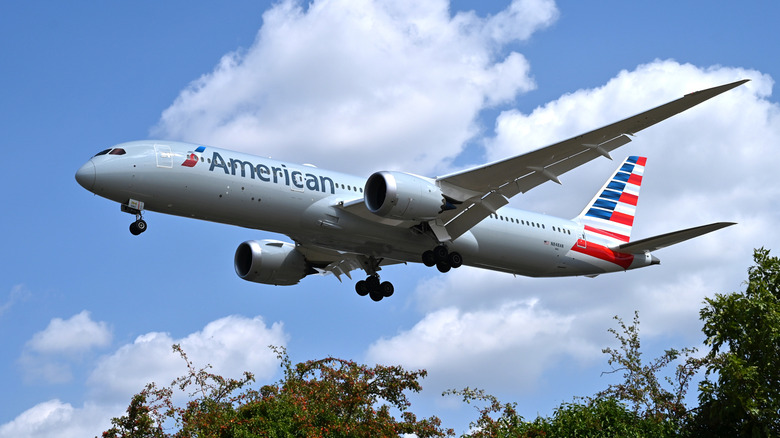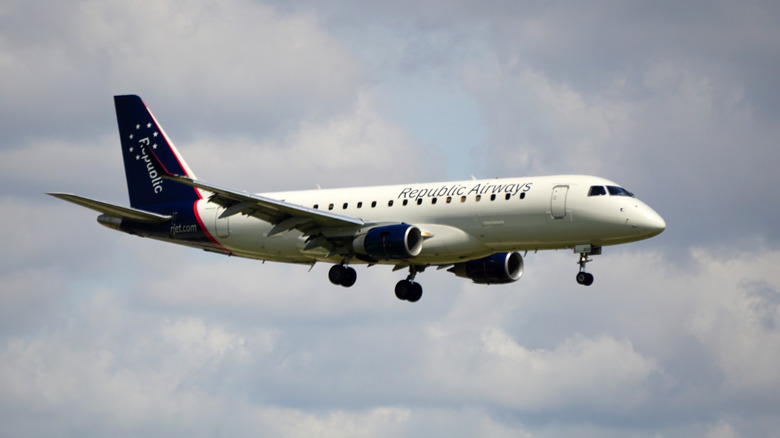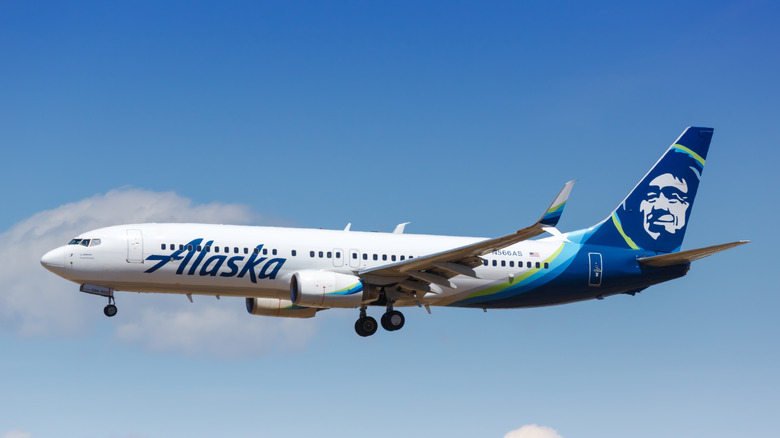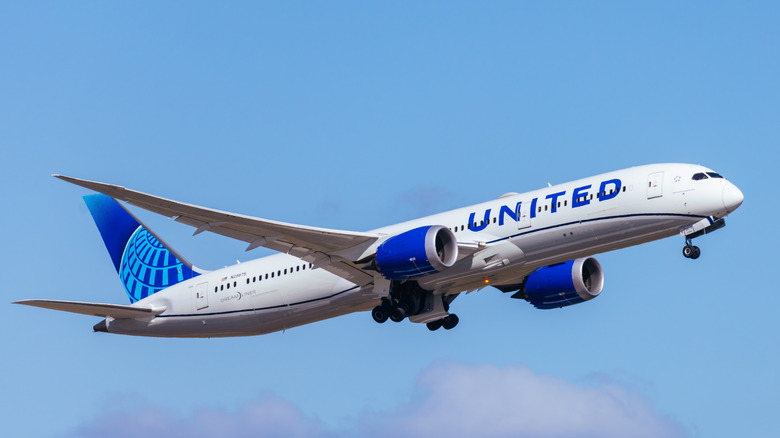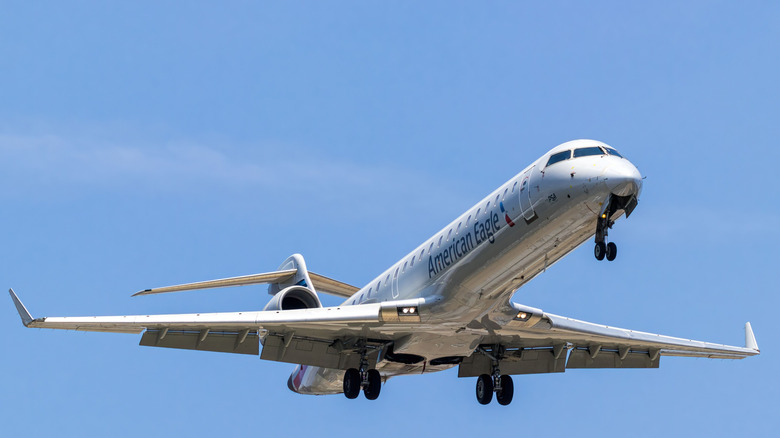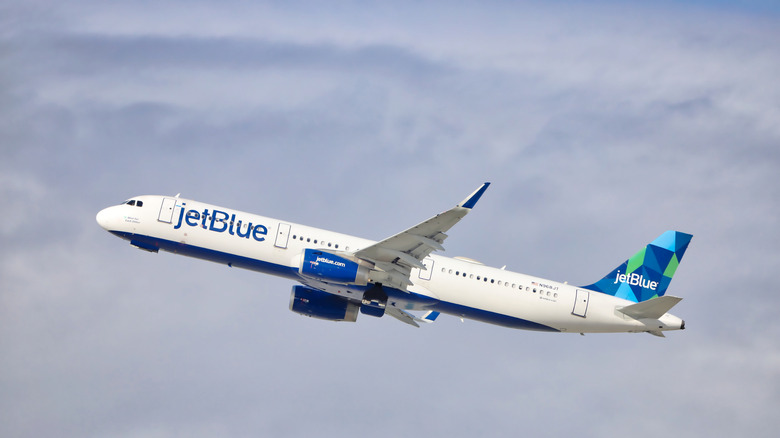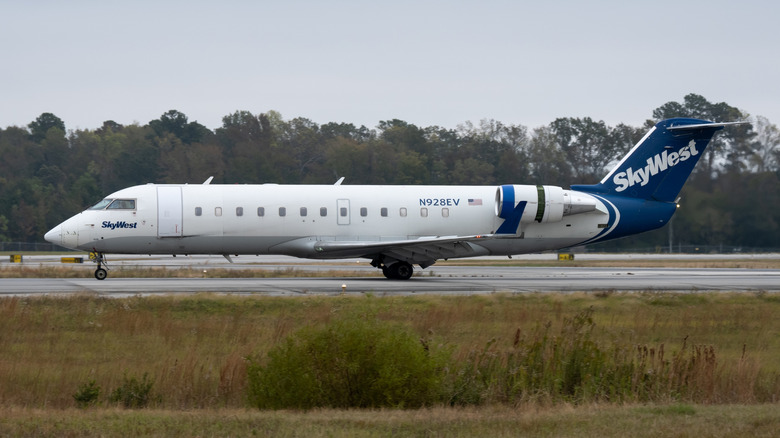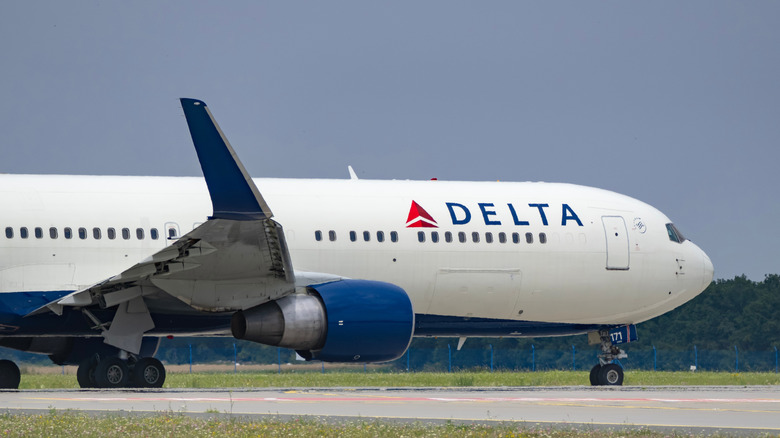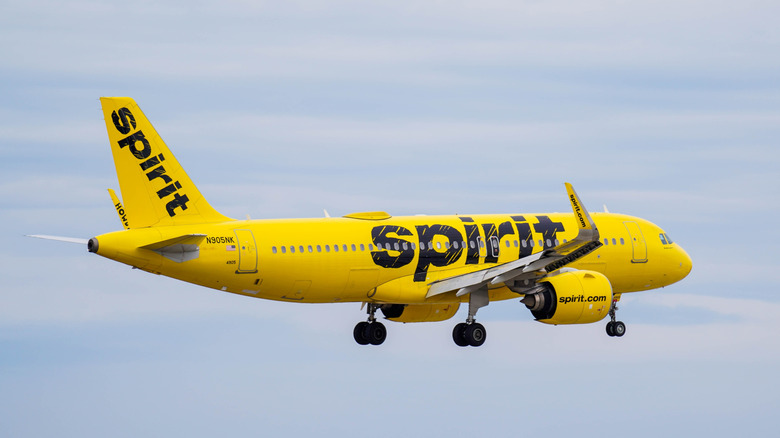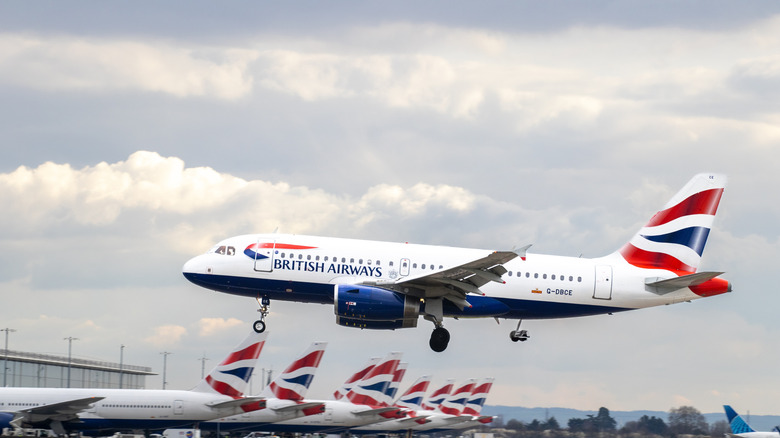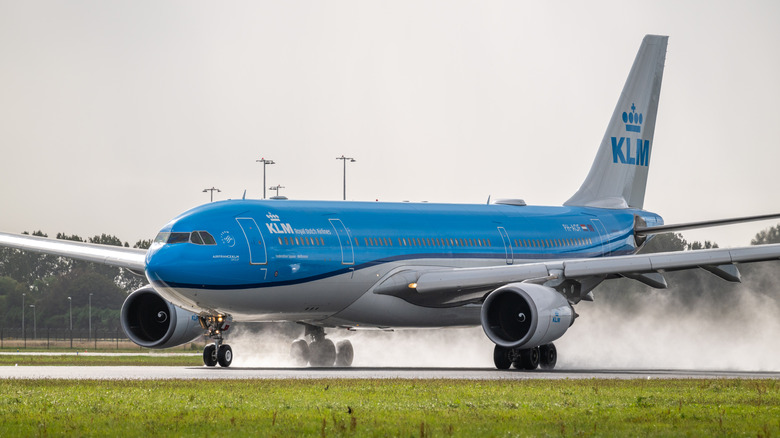These Airlines Are The Most Likely To Lose Your Baggage, According To Research
Missing a flight, missing a connection, or losing your bags are three nightmare scenarios that can ruin a vacation before it even begins. To make matters worse, they usually occur together — a tight or missed connection can mean bags never arrive at their final destination, leaving you to file a report in the hope that the airline will get your belongings back in time. No one wants to start a vacation, purchasing basic essentials, because their luggage never showed up.
To avoid this, travelers often check airlines' baggage loss records. While data is available, there's no way to predict whether you'll be among the unlucky few to lose a bag. In the United States, the rate of baggage loss is already extremely low. According to a MyBaggage.com study of U.S. Department of Transportation data — reported by the New York Post — even the worst airlines lose fewer than 1% of checked bags. Internationally, it's less clear, and despite Forbes' attempt to extrapolate numbers based on search queries for lost baggage, hard data is fleeting. When compiling our list, we considered data from both the New York Post and Forbes. These are the airlines most likely — according to both statistical and anecdotal evidence — to lose your luggage. Still, even data can be deceiving, so take the numbers with a grain of salt.
American Airlines
Topping the list for lost luggage in the United States is American Airlines, whose good reputation for offering cheap first-class seats doesn't extend to luggage handling, at least compared to its competitors. According to a study done by MyBaggage.com, cited by the New York Post, the airline lost 1,750,009 bags between January 2021 and January 2024. This averages to 8.71 bags lost per 1,000 bags loaded onto aircraft. This was out of 201 million checked bags, according to Fox.
While American Airlines appears to be the worst offender in this regard, the numbers can be a bit deceiving here. American Airlines is the largest carrier in the United States, filling 151.7 million seats (via OAG) in 2025. So, it's no surprise that this airline would have the largest amount of luggage lost in terms of absolute numbers. As a percentage, though, your odds of losing your stuff with American Airlines are still pretty low. Once you do the math, you realize that you have less than a 1% chance of having your luggage misplaced, damaged, or lost.
Envoy Airlines (formerly American Eagle)
Envoy Airlines is the largest regional carrier for American Airlines, used for shorter-haul domestic flights. Like its parent company, it came near the top of this list in second, with 224,236 reports, or 8.25 bags per 1,000 bags loaded. In terms of percentage, the chance of losing your bags on Envoy Airlines is only slightly lower than with American Airlines. Envoy handled considerably fewer bags overall — roughly 27 million during the three years covered by the study. So, although at first Envoy's numbers look better on first glance, once you go by percentages, you realize your odds of losing your luggage are about the same on both — slightly under 1%. However, you would hope that Envoy, which handles considerably fewer bags than American, would have a lower rate of loss than its parent company.
Republic Airways
Republic Airways is a local domestic affiliate for the big three American carriers: Delta, United, and American Airlines. When it comes to lost baggage, Republic ranks third, with 7.01 bags lost per 1,000 loaded — roughly 28 million bags handled and about 194,000 loss reports.
At around a 0.7% chance of losing your stuff, your odds of making it with your stuff to your destination seem pretty good. Although statistically you are less likely to lose your bags on Republic than on American or Envoy, there is one standout detail — 500 of the lost bags were mobility devices such as wheelchairs. The report does not appear to specify whether these were gate-checked or checked as standard bags. However, considering most people who use mobility devices tend to need them to get to the gate, one can assume that at least some of these were gate-checked items. Gate-checked items are left at the boarding door, loaded directly onto the aircraft, and returned to passengers upon deplaning. Given the tight chain of custody that theoretically should exist, there is no excuse for losing these items when gate-checked. This can be considered a strike against Republic Airways, despite its overall lower rate of bag loss.
Alaska Airlines
The inclusion of Alaska Airlines is probably not a shocker to public imagination, given the wave of bad press the airline has faced over the past few years, particularly in 2024. From a massive flight cancellation due to tech issues in July 2025 to the infamous boarding door blowing off the side of one of the airline's 737 MAX aircraft mid-flight (Boeing's fault), the 2020s have been nothing short of a disaster for the airline's PR department. That said, many of the issues were not the airline's fault, and the airline maintains a four-star safety rating from skytraxratings.com and is considered one of the safest airlines in the world to fly. So ranking fourth on the list for lost bags isn't exactly ideal.
According to the same study as reported by the New York Post, Alaska Airlines recorded 402,781 reports of lost bags out of roughly 60 million handled. Out of every 1000 bags, it comes out to 6.69 bags lost, meaning your chances of actually losing, misplacing, or having your belongings damaged are only 0.669%. Next to Envoy and Republic Airways in particular, these are good odds, considering Alaska handled slightly over twice as many bags as the two regional carriers and still managed a lower rate of loss. This is likely in part due to Alaska Airlines' point-to-point route model, but one can expect this rate to increase as the airline expands its reach and changes to a more hub-and-spoke model like its larger competitors.
United Airlines
United Airlines has also faced its share of bad press recently, so it might surprise some travelers that it didn't rank higher on this list. In 2023 and 2024, the airline suffered a handful of incidents, including a rudder-pedal failure, a midair engine fire, a hydraulic leak, a plane losing part of its landing gear, and a piece of the airframe flying off. Yet in terms of lost baggage, United performs relatively well, with just 6.43 bags lost per 1,000 bags handled.
As a percentage, this comes out to a 0.643% chance of losing your bag. This is quite good considering United handled over 144 million pieces of luggage in the time period studied. Given the sheer volume of luggage, United's lower loss rate compared to other carriers is certainly a positive sign.
As usual, however, the devil is in the details. Among the lost bags were over 3,300 wheelchairs. Just as with Republic Airways, there are few excuses to justify losing gate-checked items, making this a notable blemish on United's baggage loss rate.
PSA Airlines
Sixth on the list is PSA Airlines, another American Airlines regional subsidiary headquartered in Charlotte, North Carolina. In terms of total losses, PSA performs quite well. It handled around 34 million bags — a similar number to the amount handled by competitors like Envoy and Republic, which had around 28 million and 27 million, respectively. Yet, despite handling more bags than both of the latter airlines, PSA only lost 207,060 bags, or 6.06 bags per 1,000 handled, yielding a 0.606% chance of bag loss. Given the differences in volume with competitors, this is a plus for the airline.
When it comes to the details, though, travelers might want to be a tad careful. Of those 207,060 bags lost, 23,508 were mobility devices such as wheelchairs. That means around 11% of all the bags the airline lost, mishandled, or damaged were devices crucial to people's everyday ability to function — a fact made worse by the fact that these tend to be gate-checked items. While this isn't necessarily a dealbreaker for travelers, it's still something to keep in mind.
JetBlue
Despite being referred to as "America's worst airline" by the Wall Street Journal in 2023, JetBlue ranks seventh overall among American carriers that are most likely to lose your luggage. This is a plus for an airline that has gotten some bad press lately over increasing costs, cuts to service, cancellations, a failed merger with Spirit Airlines, and a battle with the U.S. Department of Transportation over excessive delays that cost the airline $2 million in fines. As to lost luggage, JetBlue lost around 251,000 bags out of 44 million handled — 5.67 per 1,000. This translates to a 0.567% chance of losing your luggage on a JetBlue flight, according to the same MyBaggage study — pretty good odds, assuming the other issues don't get you first.
The one caveat: If you are traveling with a mobility device, it may be a good idea to avoid JetBlue. While JetBlue's overall rate was low, the airline lost, misplaced, or damaged a whopping 33 mobility devices per 1,000 handled. That is over 3% of all mobility devices — not a great look, especially if they were gate-checked.
SkyWest
SkyWest is a regional Delta affiliate, but despite playing second fiddle to the much larger national airline, it still transported 38.6 million passengers between 2021 and 2024 with minimal issues — certainly nothing compared to the issues airlines like United and Alaska Airlines have faced. On August 29, 2025, the airline's flights were grounded due to what was described as a technological blip. Otherwise, the nation's largest regional carrier has run quite smoothly, a reputation reflected in the fact that it is number eight on the list with only 5.28 bags per 1,000 lost. Overall, the stats suggest an efficient baggage handling operation from beginning to end.
The number looks even better next to its competitors, chiefly Envoy and Republic, both of which handled 28 million bags each but still had a higher rate of bag loss. With only a 0.53% chance of losing your luggage, SkyWest is statistically one of the safest bets for regional travelers hoping to keep their bags intact.
Delta
In ninth place is Delta Airlines, one of America's older legacy carriers and the biggest, controlling the largest share of U.S. air traffic at 17.8% plus a large network of feeder flights through regional subsidiaries. While it is true the news in 2025 has not been the kindest to Delta, given issues with a tarmac collision at LaGuardia and issues with toxic fumes from jet engines, in the luggage department, the airline is still punching above and beyond. Given that American Airlines is 17.5% of the market, just behind Delta, and given that the two have fairly similar numbers of passengers carried per year, one would think that the rates of baggage loss would be comparable. On this metric, however, Delta blows its nearest competitor out of the water, with a much lower rate of 5.1 misplaced, lost, or damaged bags compared to American Airlines' 8.71.
There is one asterisk for Delta's stats, which are the 3,000 or so mobility devices the airline misplaced, lost, or damaged. Given how many of these are gate-checked, this number should be as close to 0 as possible. But for someone who does not face this problem, Delta is a solid bet if you want your stuff to make it to your destination.
Spirit Airlines
In tenth place, if you can believe it, is Spirit Airlines. Yes, the bankrupt, as low-cost-as-you-can-go carrier infamous for its steady stream of viral videos showing brawls at gates, counters, and onboard, was, for the period examined, the least likely airline to lose your luggage.When you think about it, it makes sense given it was voted the best airline in America of 2025 and the safest as well. Regardless, the airline handled 37 million bags and mishandled around 185,000 for a rate of 4.93 per 1000 bags handled (0.49%). Compared to Envoy, Republic, and even JetBlue — all of which handle a similar volume of baggage — that's a strong showing.
All that said, is it worth it for that extra 0.1% less chance of losing your luggage compared to Delta? A betting man would probably say that extra 0.1% chance of losing your stuff with Delta is probably not worth the risk of dealing with Spirit's bigger issues — namely, poor customer service, cramped seating, and a lot of extra fees. In fact, one might wonder if Spirit's lower rate of bag loss might reflect travelers trying to avoid checking any luggage to begin with due to the carrier's extra bag fees for both checked and carry-on luggage.
British Airways
On the international front, the worst offender —at least in terms of raw numbers of lost luggage reports — is British Airways, according to a ranking by Forbes. Based on internet search data, there are roughly 7,000 monthly searches for lost baggage linked to British Airways. This number, which was the highest among airlines searched, was extrapolated to suggest the airline lost the most bags.
Anecdotally, British Airways does appear to misplace passengers' belongings more frequently than most carriers. In fact, its nearest competitor in this department is KLM, which had nearly five times fewer searches for lost bags at 1,372 per month. But, one must remember that British Airways flies from all over the world using Heathrow — Europe's busiest airport — as a connecting hub, whereas competitors like EasyJet and Ryanair usually fly shorter-haul direct flights to mainland Europe. Passengers arriving at Heathrow, particularly on British Airways, often face connections at a sprawling, maze-like, and extremely busy airport.
British Airways advises passengers to leave at least 90 minutes between connections due to very long transfers across the airport, suggesting it will also take some time for luggage to be transferred across terminals and aircraft. If a connection is tight and the connecting flight is loaded hastily or not loaded at all, you have a significant amount of lost luggage just from one flight alone. When combined with the hundreds of flights and millions of bags British Airways handles daily, this high figure isn't surprising — though its precise statistical significance can't be determined without data on the total number of bags processed.
KLM
The second spot on Forbes' list goes to KLM, the Dutch flagship carrier and an airline you are likely to take if you want to visit Amsterdam or one of its cheaper, less-crowded neighbors. Based on search queries, you have a much lesser chance of losing your luggage, according to the data presented — around five times less, to be precise. At only 1,372 monthly searches for lost bags, that number is much lower than the nearly 7,000 British Airways deals with.
Once again, this higher number compared to the rest of the airlines on the Forbes list, which include carriers like Emirates, American Airlines, and EasyJet, is probably due to the large volumes of passengers KLM carries, not just around Europe but worldwide. According to Simple Flying, around one-third of all passengers who fly to Amsterdam are transit passengers en route to another destination — many of them likely aboard KLM flights. KLM recommends allowing at least 40 minutes for EU connections and longer for non-EU flights. If you are flying from the United States through Amsterdam to a third country and you have a tight connection, that is exactly the kind of situation in which your bags may not make it to the plane, which would explain why KLM has that higher rate of bag loss. Without the total number of bags handled, however, it is impossible to statistically compare KLM's number to British Airways.
Methodology
The methodology for this article depends on the nationality of the carrier. For American carriers, the data consists of official airline lost and missing baggage reports compiled by MyBaggage.com and reported by the New York Post, among other outlets. MyBaggage analyzed data from January 2021 to January 2024, calculating the average number of bags lost per 1,000 loaded to account for large variations in baggage volume among carriers. As for international airlines, numbers are much trickier to find because different airlines and countries use various methodologies to calculate and may study different timeframes. Any missing numbers, such as total bags handled, were calculated from available data.
Methodology for the international airlines comes from searches for lost bags as reported by Forbes. Forbes uses the total number of lost-luggage reports for 2024 as a proxy for determining which carriers are most likely to lose your luggage. However, because airlines with stronger customer service, tracking systems, and reporting mechanisms are more likely to receive lost-luggage claims than carriers that offer little assistance, these figures should be taken with a grain of salt.
